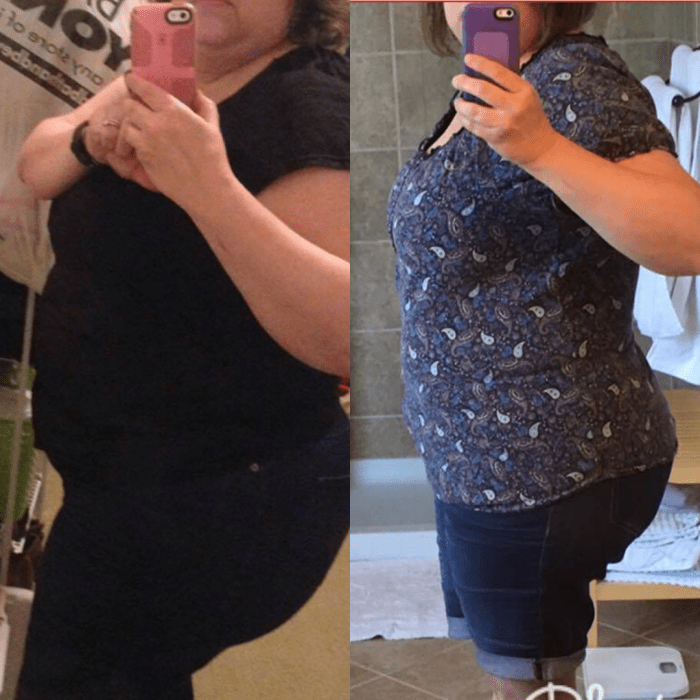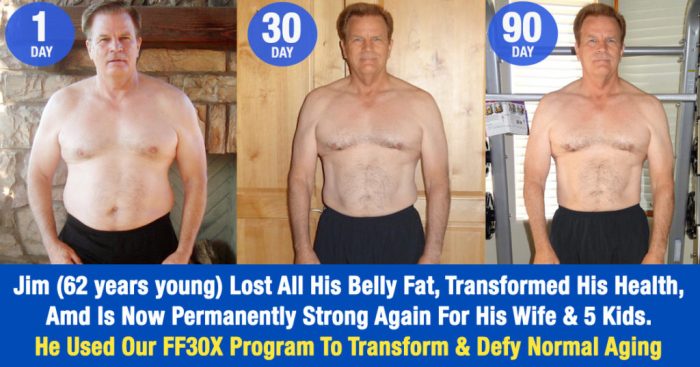Maintaining weight loss after 40 presents a unique set of challenges, but with the right strategies and mindset, it is achievable. As we age, our bodies undergo physiological changes that make it harder to shed and keep off excess weight.
But understanding these changes and implementing effective dietary, exercise, and lifestyle modifications can help us overcome these obstacles and maintain a healthy weight.
In this comprehensive guide, we will delve into the complexities of weight loss after 40, exploring the physiological factors, dietary considerations, exercise regimens, lifestyle adjustments, and emotional and social aspects that play a crucial role in long-term success. We will also provide practical tips, meal plans, and exercise routines tailored to this specific age group.
Introduction
Maintaining weight loss after 40 can be challenging, due to physiological changes that occur with age and impact metabolism, hunger cues, and body composition. Understanding these changes and adopting effective strategies can help you overcome these challenges and achieve lasting weight management success.
Maintaining weight loss after 40 can be a challenge, but it’s not impossible. If you’ve struggled to lose weight on your own, you may want to consider weight loss surgery . This option can help you lose weight quickly and safely, and it can also help you keep the weight off long-term.
Of course, weight loss surgery is not a magic bullet. You’ll still need to make healthy lifestyle changes, such as eating a healthy diet and exercising regularly. But if you’re ready to make a change, weight loss surgery can help you achieve your goals.
As we age, our metabolism slows down, meaning we burn fewer calories at rest and during physical activity. Additionally, age-related hormonal changes can lead to increased hunger and cravings, making it harder to resist unhealthy foods. Moreover, our body composition changes, with a decrease in muscle mass and an increase in body fat, which can further hinder weight loss efforts.
Physiological Changes with Age
- Decreased Metabolism:Metabolism, the rate at which the body burns calories, slows down with age due to a reduction in muscle mass and changes in hormone levels.
- Hormonal Changes:Age-related hormonal changes, such as a decline in estrogen and testosterone, can lead to increased hunger and cravings, making it harder to resist unhealthy foods.
- Body Composition Changes:As we age, our body composition changes, with a decrease in muscle mass and an increase in body fat. This shift can hinder weight loss efforts, as muscle burns more calories than fat.
Dietary Considerations
Maintaining weight loss after 40 requires a comprehensive approach that includes dietary modifications. Reducing calorie intake and prioritizing nutrient-rich foods are crucial for long-term success.
Calorie Reduction
To lose and maintain weight, it’s essential to consume fewer calories than you burn. Calorie reduction can be achieved by:
- Reducing portion sizes
- Limiting sugary drinks and processed foods
- Choosing lean protein sources
Nutrient-Rich Foods
Focus on consuming nutrient-dense foods that provide essential vitamins, minerals, and fiber. These foods promote satiety, regulate blood sugar levels, and support overall health.
- Fruits and vegetables: Rich in vitamins, minerals, antioxidants, and fiber
- Whole grains: Provide fiber, B vitamins, and complex carbohydrates
- Lean protein: Essential for muscle maintenance and satiety
Sample Meal Plan
Here’s a sample meal plan that incorporates dietary considerations for weight maintenance after 40:
- Breakfast:Oatmeal with berries and nuts
- Lunch:Grilled chicken salad with mixed greens, vegetables, and quinoa
- Dinner:Salmon with roasted vegetables and brown rice
- Snacks:Apple with peanut butter, Greek yogurt
Exercise Regimen
Regular exercise is crucial for maintaining weight loss after 40, as it helps boost metabolism, burn calories, and build muscle mass, which is essential for burning fat and preventing weight regain.
Types of Exercise
The most effective types of exercise for this age group include:
- Cardiovascular exercise:Activities that increase your heart rate, such as brisk walking, running, swimming, or cycling, help burn calories and improve cardiovascular health.
- Strength training:Exercises that build muscle mass, such as weightlifting, resistance band exercises, or bodyweight exercises, help increase metabolism and prevent muscle loss.
- Flexibility exercises:Activities that improve range of motion and reduce the risk of injuries, such as yoga, Pilates, or stretching, are also important.
Sample Exercise Plan
Here’s a sample exercise plan that can be tailored to individual needs:
- Cardio:Aim for at least 150 minutes of moderate-intensity cardio per week, or 75 minutes of vigorous-intensity cardio.
- Strength training:Incorporate 2-3 strength training sessions per week, targeting all major muscle groups.
- Flexibility:Dedicate 1-2 days per week to flexibility exercises, such as yoga or stretching.
Remember to listen to your body and gradually increase the intensity and duration of your workouts over time. It’s also important to find activities that you enjoy, as this will make it more likely that you’ll stick to your exercise routine.
Lifestyle Modifications
Maintaining weight loss after 40 requires more than just dietary and exercise changes. Lifestyle modifications play a crucial role in ensuring long-term success. These changes address the underlying habits and behaviors that contribute to weight gain and help establish a sustainable, healthy lifestyle.
Getting Enough Sleep
Sleep deprivation disrupts hormones that regulate appetite and metabolism, leading to increased cravings and decreased calorie burn. Aim for 7-9 hours of quality sleep each night to support weight management.
Managing Stress
Stress triggers the release of cortisol, a hormone that promotes fat storage. Engage in stress-reducing activities like exercise, yoga, meditation, or spending time in nature to keep stress levels in check.
Avoiding Unhealthy Habits
Smoking and excessive alcohol consumption can sabotage weight loss efforts. Smoking slows metabolism and increases appetite, while alcohol provides empty calories and impairs judgment, leading to poor food choices. Quitting smoking and limiting alcohol intake are essential for long-term weight maintenance.
Hormonal Changes
As we age, our bodies undergo hormonal changes that can impact weight loss. These changes affect metabolism, appetite, and body composition.
Estrogen and Progesterone
Estrogen and progesterone are hormones produced by women. Estrogen helps regulate metabolism and appetite. As estrogen levels decline with age, it can lead to a slower metabolism and increased appetite. Progesterone also plays a role in appetite and weight gain.
Testosterone
Testosterone is a hormone produced by both men and women. It helps regulate muscle mass and strength. As testosterone levels decline with age, it can lead to a loss of muscle mass and an increase in body fat.
Maintaining weight loss after 40 can be a challenge, but it’s definitely possible. If you’re looking for some tips, check out this article: Weight loss tips for women over 40 . It has some great advice on how to eat healthy, exercise effectively, and stay motivated.
Remember, losing weight is a journey, and there will be setbacks along the way. But if you stay focused and keep at it, you will reach your goals. So, don’t give up on yourself! You can do it!
Managing Hormonal Changes
To manage hormonal changes and support weight loss, consider the following:
- Eat a healthy diet that includes plenty of fruits, vegetables, and whole grains.
- Exercise regularly to build and maintain muscle mass.
- Get enough sleep.
- Manage stress.
- Talk to your doctor about hormone replacement therapy if you are experiencing severe hormonal symptoms.
Medical Conditions
As we age, our bodies undergo several physiological changes that can impact weight management. Certain medical conditions can also make it more challenging to maintain weight loss after 40.
Let’s explore some common medical conditions and how they can affect weight loss:
Thyroid Issues
- Thyroid disorders, such as hypothyroidism, can slow down metabolism and make it harder to burn calories.
- Symptoms may include fatigue, weight gain, constipation, and dry skin.
- Managing thyroid issues involves medication and lifestyle changes to regulate hormone levels and support weight loss goals.
Diabetes
- Diabetes, especially type 2, can lead to insulin resistance, making it difficult for the body to use glucose for energy.
- This can result in weight gain and difficulty losing weight.
- Managing diabetes involves medication, diet, and exercise to control blood sugar levels and support weight loss.
Arthritis
- Arthritis, particularly osteoarthritis, can cause joint pain and stiffness, making it difficult to engage in physical activity.
- Reduced physical activity can contribute to weight gain.
- Managing arthritis involves pain management, physical therapy, and weight loss to reduce stress on joints.
Medications
Medications can have a significant impact on weight loss and maintenance, especially after the age of 40. Some medications can cause weight gain as a side effect, while others can suppress appetite or increase metabolism. It is important to be aware of the potential weight-related side effects of any medications you are taking and to discuss them with your doctor.
Weight Gain-Inducing Medications
Certain medications, such as corticosteroids, antidepressants, and antipsychotics, can lead to weight gain. Corticosteroids, which are used to treat inflammation, can cause fluid retention and increased appetite. Antidepressants and antipsychotics can also cause weight gain by increasing appetite or slowing metabolism.
Weight Loss-Promoting Medications
Other medications, such as stimulants, thyroid hormones, and certain diabetes medications, can promote weight loss. Stimulants, which are used to treat ADHD, can increase metabolism and suppress appetite. Thyroid hormones, which are used to treat hypothyroidism, can also increase metabolism.
Certain diabetes medications, such as metformin, can help lower blood sugar levels and reduce appetite.
Managing Medication Use
If you are concerned about the weight-related side effects of your medications, talk to your doctor. They may be able to adjust your dosage or prescribe a different medication that is less likely to cause weight gain. In some cases, you may be able to manage the weight gain by making lifestyle changes, such as eating a healthy diet and exercising regularly.
Emotional Eating
Emotional eating is a common struggle for many people, especially after the age of 40. It can lead to weight gain and make it difficult to maintain a healthy weight. Emotional eating is the act of consuming food in response to emotions, such as stress, sadness, anger, or boredom, rather than hunger.
It can be a way of coping with difficult emotions or a way to self-soothe.
There are many common triggers for emotional eating, including:
- Stress
- Sadness
- Anger
- Boredom
- Loneliness
- Anxiety
- Depression
There are a number of strategies that can help you cope with emotional eating, including:
- Identifying your triggers: Once you know what triggers your emotional eating, you can start to avoid them or develop strategies for dealing with them in a healthy way.
- Finding healthy ways to cope with emotions: There are many healthy ways to cope with emotions, such as exercise, talking to a friend or therapist, or listening to music.
- Developing a healthy relationship with food: It is important to develop a healthy relationship with food. This means eating when you are hungry and stopping when you are full. It also means avoiding using food as a reward or punishment.
Social Support
Maintaining weight loss after 40 can be challenging, but social support can make a significant difference. Surrounding yourself with people who understand your goals and provide encouragement can help you stay motivated and on track.
Joining a support group or working with a registered dietitian or therapist can provide a structured environment for support and accountability. These professionals can offer personalized guidance, monitor your progress, and help you overcome challenges.
Finding and Building a Supportive Network, Maintaining weight loss after 40
- Reach out to friends, family, or colleagues who share similar health goals.
- Attend community events or fitness classes where you can meet like-minded individuals.
- Consider joining online support forums or social media groups for weight loss.
- Connect with a registered dietitian or therapist who specializes in weight management.
Motivation and Mindset: Maintaining Weight Loss After 40
Maintaining weight loss after 40 requires a strong motivation and a positive mindset. Motivation drives us to initiate and sustain healthy habits, while a positive mindset helps us overcome setbacks and stay focused on our goals.
Strategies for Staying Motivated
- Set realistic and achievable goals.
- Focus on the long-term benefits of weight loss, such as improved health and increased energy levels.
- Find an accountability partner or support group for encouragement and support.
- Reward yourself for your effort and progress, no matter how small.
- Celebrate your successes and learn from your setbacks.
Developing a Positive Body Image
A positive body image is essential for maintaining weight loss. This means accepting and appreciating your body for what it is, regardless of its size or shape.
- Practice self-compassion and avoid negative self-talk.
- Focus on your strengths and abilities, both physical and non-physical.
- Surround yourself with positive people who support your weight loss journey.
- Avoid comparing yourself to others and focus on your own progress.
Focusing on Health Goals
Instead of focusing solely on weight loss, shift your mindset to focus on improving your overall health. This includes making healthy choices for your body and mind.
Maintaining weight loss after 40 can be a challenge, but it’s definitely possible. If you’re looking for inspiration, check out these weight loss transformations for women over 40 . These women have lost significant weight and kept it off, and they’re sharing their tips and tricks for success.
Whether you’re just starting out on your weight loss journey or you’re looking for ways to maintain your weight loss, these stories will motivate and inspire you.
- Set health-related goals, such as eating a balanced diet, getting regular exercise, and reducing stress.
- Engage in activities that bring you joy and fulfillment.
- Prioritize your mental and emotional well-being.
- Seek professional help if you struggle with emotional eating or body image issues.
Long-Term Success
Maintaining weight loss after 40 is not a sprint but a marathon. It requires a long-term approach and a mindset that emphasizes consistency and patience. Crash diets and quick fixes may yield temporary results, but they are unlikely to be sustainable in the long run.
Instead, focus on making gradual, sustainable lifestyle changes that you can maintain over time.
Consistency and Patience
Consistency is key to maintaining weight loss. Aim to follow your healthy eating and exercise plan most days of the week, even if you have occasional setbacks. Don’t get discouraged by temporary setbacks; instead, learn from them and get back on track.
Patience is also crucial. It takes time to lose weight and make lasting lifestyle changes. Don’t expect to see results overnight, and don’t get discouraged if you don’t reach your goal weight as quickly as you’d like. Focus on making progress, no matter how small, and celebrate your successes along the way.
Sustainable Lifestyle Changes
Make lifestyle changes that you can sustain over time. This means choosing healthy foods that you enjoy, finding an exercise routine that you find enjoyable, and making gradual changes to your daily routine. Don’t try to change too much too soon, or you’re more likely to give up.
Start with small changes that you can gradually build upon over time.
Conclusion
Maintaining weight loss after 40 requires a multifaceted approach that addresses both the physical and psychological challenges we face as we age. By making informed choices about our diet, exercise, and lifestyle, we can overcome these obstacles and achieve our weight loss goals.
Remember, consistency, patience, and a positive mindset are key to long-term success. Embrace the journey, and you will discover that maintaining a healthy weight after 40 is not only possible but also empowering.
Quick FAQs
Is it possible to lose weight after 40?
Yes, it is possible to lose weight after 40, but it may require a different approach compared to when you were younger. Factors such as hormonal changes, slower metabolism, and lifestyle modifications need to be considered.
What are the biggest challenges to losing weight after 40?
Some of the biggest challenges include hormonal changes, a slower metabolism, decreased muscle mass, and lifestyle factors such as stress and lack of time for exercise.
What dietary changes are recommended for weight loss after 40?
Focus on consuming nutrient-rich foods such as fruits, vegetables, whole grains, and lean protein. Reduce calorie intake by cutting down on processed foods, sugary drinks, and unhealthy fats.
What types of exercise are most effective for weight loss after 40?
A combination of cardio and strength training is ideal. Cardio exercises such as brisk walking, running, or cycling help burn calories, while strength training helps build muscle mass, which boosts metabolism.
How can I stay motivated to lose weight after 40?
Set realistic goals, find an accountability partner, reward yourself for progress, and focus on the health benefits rather than just the weight loss.



